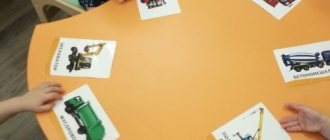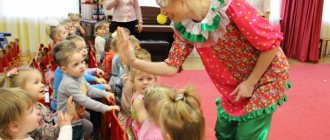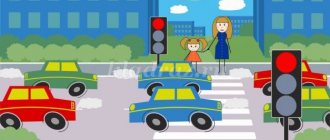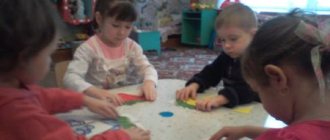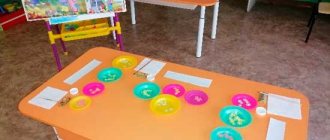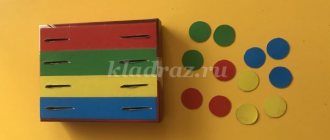Article on traffic rules
Article on traffic rules teacher Gryaznova Irina Sergeevna
It is very important in preschool age to develop skills in following the rules of behavior on the street and road. Traffic is making roads increasingly dangerous for children. Of all traffic participants, the most undisciplined are pedestrians. Accidents with children occur on the streets because children either do not know the traffic rules or violate them without realizing the dangerous consequences. Therefore, it is very important to instill in children a sense of responsibility for their behavior on the street and to ensure that compliance with traffic rules becomes a habit for them. And the teacher’s task is to instill in children skills and abilities related to road safety.
We teach children traffic rules from an early age. In kindergarten, a child must learn the basic concepts of road traffic, as well as learn the most important rules of behavior on the road.
Our group has created a “Safety Corner”, where visual and game material on traffic rules is collected. Children play games independently and look at illustrations. We introduce children to fiction on traffic rules: S. Mikhalkov “Uncle Styopa the Policeman”, “Traffic Light”, “Truck”, B. Zakhoder “Chauffeur”, A. Barto “Truck”, etc. We created a folder with riddles about pedestrian crossings, traffic lights, and road signs, which the children take to look at on their own. We conduct didactic games and word games with children: “Light the traffic light”, “We are drivers”, “Guess the sign”. We play outdoor games: “Bus”, “Truck”, “Sparrows and a car”, role-playing games: “Transport”, “I am a driver”. We conduct conversations: Why do we need a traffic light, why do we need road signs, is it possible to play on the road, why can’t we play on the road? Together with the children, we drew “Traffic Light” with cotton swabs in order to reinforce the traffic light signals. We observe moving vehicles while walking.
To instill in our children the skills of correct behavior on the street and road, we need painstaking, everyday explanatory work with the participation of parents. The knowledge acquired by children in kindergarten should be reinforced at home, in the family. In the reception areas we post consultations for parents “We follow traffic rules for adults and children”, “Children’s car seats”, “Laws of streets and roads”, etc. First of all, parents should remember the power of personal example: if mom, dad or grandmother crosses the street in an unauthorized place, does not pay attention to traffic lights, or runs across the road at a close distance from traffic, then the most conscientious work of the teacher will be ineffective. You need to remember, you are not alone on the street! Children follow the example of adults!
Summary of GCD on traffic rules in the early age group
Summary of GCD on traffic rules in the early age group “Magic Lights”
I bring to your attention a summary of direct organized activities on traffic rules in the early age group “Magic Lights”.
This material can be used by teachers in preschool educational institutions. This summary is aimed at strengthening the skills of safe behavior of children on the street, instilling cultural behavior on the road, and studying the Rules of the Road. Goal: 1. Teach children to distinguish colors: red, yellow, green. 2. Introduce children to traffic lights and the rules for safely crossing the road at a pedestrian crossing. Educational task: to instill in children a sense of responsibility, instill cultural behavior on the road. Preliminary work: 1. Looking at illustrations about traffic rules 2. Reading poems and stories about traffic rules 3. Showing a toy traffic light and looking at it, talking about the purpose of the traffic light. 4. Familiarization with the road markings of a pedestrian crossing - “zebra” 5. Role-playing games Material: mugs of three colors (red, yellow, green), a basket, a traffic light toy, a pedestrian crossing sign, multi-colored cardboard steering wheels, four identical strips of white paper - pedestrian crossing, toys: dog and hedgehog.
Progress of the lesson:
The dog comes and brings red, yellow and green mugs in a basket.
The teacher offers to take the children one mug each. Children take one mug and name its color. The teacher asks the children who have red mugs in their hands to come out. Red color - no access!
The teacher asks the children who have yellow mugs in their hands to come out. Yellow - be ready for the journey,
The teacher asks the children who have green mugs in their hands to come out. And the green color - go!
(If the children make a mistake, the dog barks loudly, and the children correct the mistake) The teacher offers to play the game “Cars”. Children take the steering wheels in their hands and drive in a circle in one direction, reading a poem. We're driving, we're driving, we press the pedal.
We switch gears, We look intently into the distance. The windshield wipers clear the drops to the right, to the left. Purity! The wind ruffles my hair. We are drivers anywhere! The color lights up red (the teacher shows a red circle) - the children - the cars stop, the light turns green (the teacher shows a green circle) - the children - the cars drive on, reading the poem.
There is a knock on the door.
A hedgehog comes in, says hello, and tells the children how he was in a hurry to get home to his hedgehogs, but couldn’t cross the road because there were a lot of cars on the road. The hedgehog asks the teacher and the children to teach him how to cross the road correctly. Educator: Guys, let's show the hedgehog how pedestrians behave on the road? Children (in chorus): Yes. The teacher reads a riddle about a pedestrian crossing: The stripes are familiar to everyone. Children know, adults know. Leads to the other side (points to the crossing) Children: pedestrian crossing! (in unison) Let's show the hedgehog how to cross the road at the pedestrian crossing! Game "We are pedestrians." There are children standing at the pedestrian crossing and a hedgehog in the hands of one of the children. Waiting for the traffic light to cross the street. The teacher shows a red traffic light: “Can I cross the road?” Children: No. The teacher shows the green traffic light: “Can I cross the road?” Children: Yes. A hedgehog and children cross the road at a zebra crossing. The game is repeated several times.
After the game, the hedgehog turns to the children: “Thank you, guys! Now I know how to cross the road correctly. And you remember that you can only cross the road with adults at a pedestrian crossing and only when the traffic light is green! Goodbye, guys!" The guys say goodbye to the hedgehog and the dog. The lesson is over.
We recommend watching:
Summary of GCD in the first junior group on traffic rules From the experience of working as a kindergarten teacher. Game for children of primary preschool age Didactic game on traffic rules in an early age group Synopsis of an integrated lesson for an early age group “Sorceress - water”
Similar articles:
Games to develop classification skills for children 2-3 years old
Games for the development of the articulatory apparatus for children 2-3 years old
Games for teaching counting with children 3-4 years old
Didactic tasks for a walk in kindergarten. Junior preschool age
Training children of the younger group in labor activities
MAGAZINE Preschooler.RF
Summary of the traffic rules lesson in the first junior group “Our assistant traffic light”Purpose of the lesson: Continue to develop safe behavior skills in children;
Tasks:
- consolidate knowledge of the basic colors of traffic lights (red, yellow, green), the shape of a circle
- consolidate children's understanding of traffic lights and their actions
- develop attention and speech.
Materials for the lesson: 3 layout of a traffic light, glue, brushes and napkins according to the number of children, a bunny toy, circles of red, yellow, green colors (according to the number of children), an image of a zebra, a layout of a pedestrian crossing.
Individual work: consolidate knowledge of the location of traffic light colors, monitor the correct sequence of traffic light colors (red, yellow, green).
Progress of the lesson:
Surprise moment: A bunny comes to visit the children
Organizing time:
Educator: guys, a bunny came to visit us today, he came to us from his doll town, he is very interested in how our children play in kindergarten. Let's say hello to the bunny in unison.
Children: say hello
Educator: Leads the children to the traffic light and asks
Guys, look here, what is this worth here?
Children: traffic light
Educator: Why do we need it?
Children: A traffic light helps adults and children cross the road correctly
Educator: He stands on the streets of the city and with his eyes shows people and cars when they can drive or cross the road. Guys, let's count together how many eyes he has?
Children: Counting
Educator: Artem, what kind of eye does the traffic light have below?
Dasha, what kind of eye does the traffic light have at the top?
Sofia, what kind of eye does the traffic light have in the middle?
Educator: Now let's remember what we do if the light is red?
Children: standing
Educator: What do we do if the light is yellow?
Children: get ready to go
Educator: What if the green light turns on?
Children: go
Educator: Now let's go for a walk. Look how interesting the path is.
What's on the path?
Children: stripes.
Educator: What color are they?
Children: white, black.
Educator: Look what I have in my hands?
Children: zebra
Educator: This is such a horse. It has white and black stripes. This horse's name is zebra. Repeat, what is the horse's name?
Children: zebra.
Educator: Our track has the same stripes as the horses. That's why she is also called zebra. This is a pedestrian crossing. You can cross the road on it when the green eye at the traffic light is on. Look at the little eye on the traffic light?
Children: green.
Educator: that means you can cross the road. Guys, come in pairs and we will cross the road.
Children: crossing the road.
Teacher: reads a poem
If the light turns red, it means it is dangerous to move.
Yellow warning light, wait for signal to move.
The green light says: go ahead, the path is open.
Educator: guys, the bunny came to visit us and we shouldn’t let him go without a gift. We will make a traffic light for his doll town so that he also knows the rules of the road and is very attentive (children sit at tables on which there are traffic light models)
Practical part:
Each of you has eyes - these are circles made of colored paper.
First we take the red circle, this is the upper eye of the traffic light. And put it on top.
Then we take the yellow eye - this is the middle eye of the traffic light. We put it under red. And the last green circle is the bottom eye of the traffic light. Try to glue evenly and carefully so that the bear likes your traffic lights.
The teacher approaches the children and conducts individual work (monitors the sequence so that they are evenly positioned).
Educator: What does the color red mean?
Children: standing
Educator: What does the color yellow mean?
Children: ready to go
Educator: What does the color green mean?
Children: let's go
Educator: Well done, guys. Everyone did a very good job. I hope you all cross the road correctly. Always be attentive and careful.
The bunny thanks the children for the gifts.
The bunny says goodbye to the children.
Children: say goodbye to the bunny.
| Next > |
